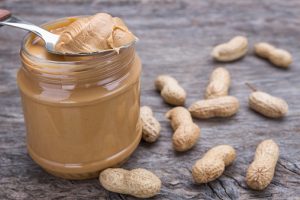
You may not have realized it, or maybe you still don’t, but peanut butter can offer many health benefits anywhere from your weight to even cardiovascular health so let us explain these many health benefits and provide you with much reason to go back to consuming the childhood favorite snack.
5 reasons to eat more peanut butter
Helps with weight loss and muscle building
Whether you’re feeling sluggish, need more boost for your workouts or are suffering from low testosterone, peanut butter can help you with all these aspects. Peanut butter contains high levels of zinc which is known to play a role in hormones and has been found to increase testosterone levels naturally over the course of four weeks when consumed regularly.
Additionally, other research has shown that consuming monosaturated fats can boost testosterone more so than those who do not consume monosaturated fat. With an increase in testosterone you will find not only do you have more energy but you can build muscle and reduce fat.
Furthermore, even though peanut butter has fat which may seem counterproductive if you want to lose weight, studies have shown consuming monosaturated fat can actually aid in weight loss. Consuming monosaturated fat has been found to promote weight loss more so than consuming a low-fat diet. More so, peanut butter contains protein which keeps you fuller, longer meaning you won’t consume excess food.
Peanut butter contains minerals and nutrients
Nutritionally speaking peanut butter also contains many essential minerals and vitamins. Peanut butter contains potassium which helps regulate fluid in the body and has been shown to help with blood pressure. Peanut butter also contains magnesium, vitamin E and B6, small amounts of iron, manganese, and selenium when consumed regularly all help promote a healthy body.
High in antioxidants
Antioxidants are essential to help ward off free radical damage which can affect every part of your body including your hearing, vision and skin. You may be familiar that many fruits and vegetables contain high levels of antioxidants but if you’re looking for a creamier, richer snack, than you can still get your antioxidant fix from peanut butter. Furthermore, if you want to boost your antioxidant intake, peanut butter easily pairs with many fruits and vegetables to really protect your body from free radical damage.
We already mentioned that peanut butter has potassium which can help with blood pressure, but peanut butter can help the heart in other ways as well. One study found that regular consumption of peanut butter can reduce the risk of heart disease by half.
Peanut butter can help reduce inflammation of blood vessels and aid in reducing cholesterol levels – both factors of heart disease.
In another study found in the British Journal of Nutrition, researchers found the consumption of whole nuts – or peanut butter – at least four times a week reduced the risk of coronary heart disease by 37 percent in comparison who rarely ate them.
Peanut butter is also a great food to help protect the brain and cognitive function. It is high in essential vitamins and nutrients which your brain requires in order to stay healthy and protect it against age-related cognitive decline.
In one study which consisted of nearly 4,000 participants over the age of 65, those who consumed more of the essential nutrients found in peanut butter had better cognitive function compared to those who did not. Other research has supported these findings and found among 815 people over the age of 65, those who increased their nutrient intake which are found in peanut butter they were better protected against Alzheimer’s disease compared to those who did not.
As you can see peanut butter can help benefit every aspect of your body and health so it may be a good idea to go back to those classic peanut butter sandwiches you once loved. It is important to note that with all good things moderation is still key; even though peanut butter contains good fat, it is still fat so be mindful of this. Additionally, store-bought varieties may contain extra additives which you don’t need so our recommendation is to go natural or even make it yourself.
Related Reading:
How a whiff of peanut butter could detect Alzheimer’s disease
Disorders of the brain can be incredibly difficult to diagnose and treat, simply because of the sheer complexity of brain function. Despite the fact that Alzheimer’s disease is one of the most common forms of brain disorder in the world, researchers still don’t understand its root cause or how to cure it, and must employ a battery of rigorous procedures and medical assessments just to diagnose it. Continue reading…
Tree nut consumption reduces risk of cardiovascular disease
New findings suggest the consumption of tree nuts may help reduce the risk of cardiovascular disease. The findings were uncovered with the use of a systematic review and meta-analysis of 61 controlled trials. The findings revealed that consuming tree nuts, such as walnuts, lowered total cholesterol, triglycerides, LDL cholesterol and ApoB – the primary protein found in cholesterol. Continue reading…
Sources:
http://www.cheatsheet.com/health-fitness/5-health-benefits-of-peanut-butter.html/?a=viewall